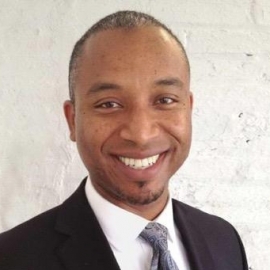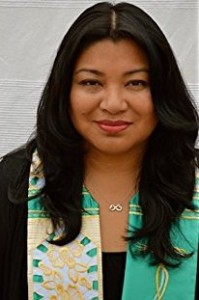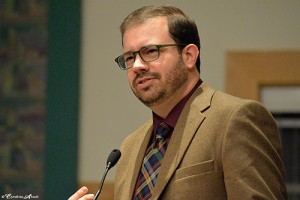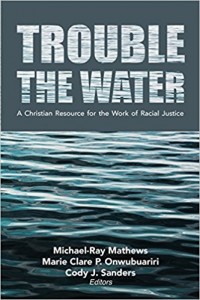Trouble the Water: A Christian Resource for the Work of Racial Justice
What responsibility do churches have for the work of racial justice? What are the challenges of this work? How do we dismantle white privilege and white supremacy? How do we build coalitions to address the intersection of racism, sexism, heterosexism, and other injustices? How do we create communities of equality, justice-love, and peace? These are among the questions addressed in Trouble the Water, edited by Michael-Ray Mathews, Marie Clare P. Onwubuariri, and Cody J. Sanders.
For many years I’ve been exploring these questions and collaborating with others on intersectional justice work. Recently Grace Ji-Sun Kim and I co-edited Intercultural Ministry: Hope for a Changing World. In this book we address some of the same questions as those addressed in Trouble the Water, but with a different focus: the creation of intercultural churches and other ministries for the work of racial justice and equality. Trouble the Water provides resources for this work for individuals and churches, both monocultural and multicultural. I welcome this outstanding new book that has stirred my thinking and strengthened my spirit for the work of racial justice.
In the Introduction to Trouble the Water, the editors write: “At a time in our country and in our world when expressions of interpersonal prejudice and structural racism are validated and even valorized, this is a resource whose time has come.” They note the book’s publication several months after our “national election that threatens the well-being of all who live their lives at the intersections of oppression because of race, gender, class, sexual orientation, gender identity, immigration status, religion, health and ability, and a host of other markers of human difference.” Trouble the Water centers racial justice while connecting it to other justice concerns. I appreciate this intersectional approach to justice work.
Birthed and nurtured in the Racial Justice and Multiculturalism Community in the Alliance of Baptists, Trouble the Water includes chapters by 23 diverse authors engaged in racial justice work from an intersectional approach. One of the editors, Marie Clare P. Onwubuariri, has also been involved with the Equity for Women in the Church Community, which I co-chair, and I have been connected with the Racial Justice and Multculturalism Community. We have found our missions intersecting as both communities work for racial and gender justice.
The title Trouble the Water comes from the Negro spiritual “Wade in the Water.” When the book was in the planning stages, the editors invited a diverse group of church leaders to gather with them to talk about content that would be important for this resource. After each person spoke, others responded through notes posted on a board while the whole group sang the refrain of “Wade in the Water”: “Wade in the water, wade in the water children, wade in the water, God’s gonna trouble the water.” The editors comment that these lyrics reminded them that “God has heard and will continue to hear the cries of the oppressed and will ‘trouble the waters’ as an act toward the release and freedom of God’s beloved.” Also, to “trouble the waters” became their motivation for staying engaged in the work of this book project.
Trouble the Water provides the necessary theological foundations for the work of racial justice, gives readers tools for engaging in this work, and includes inspiring stories from churches doing this justice work. Ideal for laypeople and clergy to use in church study groups, retreats, workshops, conferences, academic classes, and personal exploration, this book also includes helpful questions for reflection at the end of chapters.
There is a wealth of wisdom, inspiration, and challenge in Trouble the Water. I’ll give highlights from some of the chapters.
In a chapter titled “Resistance We Can Imagine: Cultivating Ecclesial Imaginations for Racial Justice and Healing in Public Life,” Michael-Ray Mathews states that the “work of racial justice in congregations must be understood as an ecclesial practice with public impact.” He tells the compelling story of his joining other clergy and organizers in visiting Ferguson, Missouri, in the wake of the uprising following the shooting death of Michael Brown. On one occasion he stood with hundreds of clergy from all over the country in the pouring rain outside the Ferguson Police Department calling for repentance and experiencing repentance and renewal. “We were being baptized into a movement for justice,” he writes. “We began to sing, ‘Wade in the water, wade in the water, children, wade in the water, God’s gonna trouble the water.’” Ray challenges us all to “trouble the waters: to disrupt and confront injustice, and to resist and tear down dehumanizing structures so that we can create new systems that honor our God-given dignity.”
Marie Clare P. Onwubuariri, in a chapter titled “An Intersectional Approach to the Work of Justice: Beyond the Default Categories of Identity,” invites us to go beyond the “binary (Black-White) and sometimes ternary (Black-White-Brown) racial conversations in the United States” to include people “who resonate more readily with ‘hybridity’ versus standard racial identities.” I appreciate her expansive view of intersectionality, including diverse racial identities along with diversity in ethnicity, gender, age, class, sexual orientation, and physical ability. Onwubuariri writes about the necessity of “coalitions” and “collaborative efforts” to address justice concerns on personal, interpersonal, institutional, and cultural levels. In keeping with her inclusion of a wide range of people, she offers a variety of approaches to racial justice work so that each of us can find a way that fits our gifts and training. She draws from Reyes-Chow’s book But I Don’t See You As Asian: Curating Conversations About Race to identify four different approaches for people to use in advancing racial justice: “relationships, academia, activism, and the arts.”
In his chapter “Being Brown When Black Lives Matter,” Miguel A. De La Torre also encourages inclusive racial justice work. While taking care not to diminish the Black Lives Matter movement, as whites have done by insisting that all lives matter, he calls us beyond the black/white dichotomy in our racial justice work. This dichotomy “ignores the largest U.S. minority group, who are also the deadly targets of law enforcement and who, thanks to our immigration laws, now represent the largest ethnic/racial group in federal prisons.” He tells the tragic story of Anastasio Hernandez Rojas, who was beaten to death by more than a dozen Border Patrol agents but, unlike Eric Garner and Michael Brown, remains unknown to most Americans because there is little media coverage of the brutal killings of undocumented immigrants. De La Torre challenges communities of color to build coalitions to confront the prevailing social structures protecting white privilege.
In their chapters Malu Fairley and Melissa W. Bartholomew include powerful stories of their experiences as African Americans in majority white churches. In a sermon to her church, Fairly shared her personal emotional response to the not guilty verdict of George Zimmerman for the tragic murder of Trayvon Martin. She expressed her rage, sorrow, and fears for her own son: “I reminded them that to love him included his being African-American. Being color-blind or not seeing his ethnicity was a denial of the fullness of his personhood. His blackness mattered. I shared my fear that as he grew older our society would see him as inherently dangerous, and a problem.” She demonstrates how this “authentic, provocative sharing, connecting,” can lead to mutual transformation in our “racial/economic/social justice work.” Bartholomew writes about the trauma she experienced when she saw a hateful racial slur written on her church’s Black Lives Matter sign. “Ironically, I was going there to meet with my pastor, Rev. Cody Sanders, to discuss his invitation to contribute to this racial justice resource for congregations.” She acknowledges “the challenge of being one of two—or the only African American—in meetings or forums” connected to her church’s racial justice ministry: “I can no longer pretend that the work of racial justice is the same for people of color as it is for white people. Racism impacts each ethnic and cultural group differently. Our roles in the work are different, and so are our needs.” She realizes her need to reconnect to the Black Church for the work of healing her racial trauma wounds while continuing her racial justice activism within her white church community.
Trouble the Water includes important chapters on work for white people on the path to racial justice. Soon after I was ordained in 1985, before the terms “white privilege” and “intersectionality” were commonly used, I recognized on some level the connection between racism and sexism. I later came to understand that racism, sexism, heterosexism, classism, and all injustices are connected. As an ordained Baptist clergywoman, I have experienced my share of sexism, but I have come to understand also my privilege as white, straight, and middle-class. Reading the chapters by Jennifer Harvey and Tammerie Day deepened my understanding and illuminated my racial justice work as a white person. Harvey comments that “white guilt” is a healthy response for people committed to equality who understand we benefit from inequity and that “the antidote to being immobilized by white guilt is action.” But she cautions that “white work” should be in support of racial justice work “in which people of color’s experiences and leadership are centered.” Day explores spiritual practices to help white people in our anti-racist work, beginning with repentance: “When we allow the Holy Spirit to have her way with us in our remorseful confession and lament, we open ourselves to possibilities for repentance.” We stop racist practices such as “racist humor, ignoring whiteness, inattention to privilege, white religious imagery, white bonding, white fragility and ‘we’ve always done it this way.’” Another spiritual practice is working for transformation “by finding the work communities of color are already doing, and joining them in it.”
Another excellent chapter is Isabel Docampo’s “The Role of Immersion in the Work of Racial Justice.” From a postcolonial view of missions as sustained, mutual relationship with local church leaders, she encourages congregations to engage in immersion/mission trips within our own cities and overseas to help us “understand how trade, foreign policies, hegemony, and institutionalized racism and sexism are taking root both in our cities and abroad, and how they are interconnected.” To travel with integrity and intentionality, we need “self-awareness, authentic faith, and ongoing reflection,” writes Docampo. “We are created in the womb of the Divine and are bound together irrevocably. Our path to the Divine is to journey together as sisters and brothers bound by love. For this reason, Jesus commissions us to ’Go!’ beyond our borders and boundaries to reach out to one another. Mission and immersion trips that work toward authentic encounters break open oppressive, institutionalized racist and gendered structures and discover how the Divine’s power of love continues to resurrect amidst modern-day crucifixions.”
LeDayne McLeese Polaski and Kadia Edwards propose Conflict Transformation (CT) for our work of racial justice. For their insightful chapter they draw from their work with Baptist Peace Fellowship of North America (BPFNA) in leading CT training. They view conflict as an “inherent part of human life that unlocks an immense amount of energy.” Conflict Transformation “releases positive power and channels that tremendous energy toward lasting, constructive change.” They acknowledge that the work of transformation is immense because the “disease of racism” goes “far back into our history” and “far down into our souls.” In moving forward, we must create safe spaces for people to share stories that evoke fear, anger, agony, and conflict. Polaski and Edwards emphasize self-care as crucial for this long and hard work and the importance of training to facilitate CT. They include a note that BPFNA offers this CT training to churches and other groups.
In her chapter Deborah DeMars Conrad, a pastor in Flint, Michigan, makes the important connection between racial justice and environmental justice. The infrastructure problem that caused poisoned water in Flint hasn’t been fixed after more than two years, and an EPA official indicated it’s not a priority. Flint is sixty percent black, 40 percent poor, and more than 25 percent unemployed. Conrad writes: “You cannot understand this manufactured emergency without talking about racism, about economic inequality and disempowerment, corporate pillaging and a thousand acres of industrial brownfield poisoning the river, plus the community-depleting effects of mass incarceration and the underlying presumption that people of color are not credible sources of information about the realities of their own lives.” She continues to connect racial and environmental justice: “Environment justice means tending to the wholeness of creation. Racial justice is also about wholeness—the right of historically exploited and oppressed people to be made whole.”
Christine Y. Wiley and Dennis W. Wiley illustrate what Martin Luther King called the “beloved community” in their inspiring story of Covenant Baptist UCC in Washington DC. Covenant has modeled an intersectional approach to justice for many years. In 1969 this previously all-white church called a black pastor and opened its doors to black people, and in 1985, hired a woman minister. In 2004, Christine and Dennis became co-equal pastors “with equal authority, responsibility, and compensation,” and the church voted to become open and affirming to the LGBT community. They write: “A long time ago some white Southern Baptist laypersons started a legacy of inclusion, justice, equality, and liberation, and we look forward to what God will do as She continues to build this beloved community.” They challenge churches to model the beloved community “within its walls” so that it will also become reality “outside its walls.”
Trouble the Water is a must-read for individuals and congregations who want to work toward racial justice, while attending to intersecting oppressions, so that we all have freedom to flourish in the divine image.
Editors
 Michael-Ray Mathews is an ordained American Baptist minister and leading pastor in the multifaith movement for justice. He brings nearly 30 years of ministry leadership experience as a senior pastor, grassroots leader, psalmist, and community organizer to his work as the Director of Clergy Organizing for PICO (People Improving Communities through Organizing) National Network in Oakland, California. Since 2014, Rev. Mathews’ leadership has centered on the Theology of Resistance. Developed in the aftermath of the killing of unarmed teen Michael Brown in Ferguson, Missouri, Theology of Resistance is a prophetic, multifaith discourse intended to ignite conversations and spark faith leaders to fight injustice and dehumanization and cultivate Beloved Community. He serves as co-convener of the Racial Justice and Multiculturalism Community within the Alliance of Baptists. [Twitter: @mrmathews]
Michael-Ray Mathews is an ordained American Baptist minister and leading pastor in the multifaith movement for justice. He brings nearly 30 years of ministry leadership experience as a senior pastor, grassroots leader, psalmist, and community organizer to his work as the Director of Clergy Organizing for PICO (People Improving Communities through Organizing) National Network in Oakland, California. Since 2014, Rev. Mathews’ leadership has centered on the Theology of Resistance. Developed in the aftermath of the killing of unarmed teen Michael Brown in Ferguson, Missouri, Theology of Resistance is a prophetic, multifaith discourse intended to ignite conversations and spark faith leaders to fight injustice and dehumanization and cultivate Beloved Community. He serves as co-convener of the Racial Justice and Multiculturalism Community within the Alliance of Baptists. [Twitter: @mrmathews]
 Marie Clare P. Onwubuariri is an ordained American Baptist minister serving as Regional Executive Minister (REM) of the American Baptist Churches of Wisconsin. She holds the distinct honor of being the first female and first person of color in this position in the state and the first Asian-American female REM in the denomination. In her pastoral, administrative, and educational ministries, Rev. Onwubuariri strives to embody an approach that integrates cultural self-knowing, and interpersonal and organizational practices that affirm the value of and ensure equity for all people. She ventures to develop the expressions of her intersectional soul through the media of poetry, photography, and piano and incorporates these into the breadth of her ministry passions. She has been involved with the Alliance of Baptists since 2008, particularly in the work of Equity for Women in the Church and the Racial Justice and Multiculturalism Communities. [Twitter: @MarieCPO]
Marie Clare P. Onwubuariri is an ordained American Baptist minister serving as Regional Executive Minister (REM) of the American Baptist Churches of Wisconsin. She holds the distinct honor of being the first female and first person of color in this position in the state and the first Asian-American female REM in the denomination. In her pastoral, administrative, and educational ministries, Rev. Onwubuariri strives to embody an approach that integrates cultural self-knowing, and interpersonal and organizational practices that affirm the value of and ensure equity for all people. She ventures to develop the expressions of her intersectional soul through the media of poetry, photography, and piano and incorporates these into the breadth of her ministry passions. She has been involved with the Alliance of Baptists since 2008, particularly in the work of Equity for Women in the Church and the Racial Justice and Multiculturalism Communities. [Twitter: @MarieCPO]
 Cody J. Sanders, PhD, is pastor of Old Cambridge Baptist Church in Cambridge, Massachusetts, serves as American Baptist Chaplain at Harvard University, and teaches on the adjunct faculty in pastoral care at Andover Newton Theological School. He is author of Queer Lessons for Churches on the Straight and Narrow: What All Christians Can Learn from LGBTQ Lives, co-author of Microaggressions in Ministry: Confronting the Hidden Violence of Everyday Church, and author of A Brief Guide to Ministry with LGBTQIA Youth. Rev. Sanders has served as co-convener of the Racial Justice and Multiculturalism Community since its inception within the Alliance of Baptists. [Twitter: @QueerBaptistRev]
Cody J. Sanders, PhD, is pastor of Old Cambridge Baptist Church in Cambridge, Massachusetts, serves as American Baptist Chaplain at Harvard University, and teaches on the adjunct faculty in pastoral care at Andover Newton Theological School. He is author of Queer Lessons for Churches on the Straight and Narrow: What All Christians Can Learn from LGBTQ Lives, co-author of Microaggressions in Ministry: Confronting the Hidden Violence of Everyday Church, and author of A Brief Guide to Ministry with LGBTQIA Youth. Rev. Sanders has served as co-convener of the Racial Justice and Multiculturalism Community since its inception within the Alliance of Baptists. [Twitter: @QueerBaptistRev]
